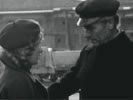Eye For Film >> Movies >> Diary For My Children (1984) Film Review
Márta Mészáros’ Diary For My Children is a somewhat neglected European film from the other side of the Iron Curtain. The semi-autobiographical tale focuses on Juli, a young orphaned girl who returns to her native Hungary after WWII and a stint in the Soviet Union, where her father ‘disappeared’ and her mother died in childbirth. Taken in by an old friend of her parents, Juli is horrified to realise Hungary is rife with the same oppressive social ideologies that gripped Russia.
Juli is fostered by Magda (Anna Polony) and looks to János for a father figure (he is played by Jan Nowicki who also portrays Juli’s father in the dream sequences/flashbacks). The central performance of Zsuzsa Czinkóczi as Juli is astounding. Appearing innocent and vulnerable as well as defiant and stubborn, she fully fleshes out her character and breathes irresistible life into her and her plight. It is a joy to watch her square off against Polony as the brash matriarch Magda. As fragments of Juli’s past are relayed through daydreams it becomes obvious that her need for understanding of where she has come from and her sense of self, place and purpose are what drive her, and, indeed, the narrative of the film. Tied into her microcosmic rebellion is her desire to escape, illustrated by her truancy and frequenting of the cinema where she can escape from her real life in the womb-dark of the matinee.

Diary For My Children was quietly rushed into production in the early Eighties and it is interesting that a film so blatantly critical of the Communist regime slipped past the rabid censors. The film delicately and daringly places a specific time and place in history under the microscope and, by showing us events from Juli’s point of view, humanises and contextualises proceedings. Palpable throughout is the notion that circumstances so often impact on an individual’s path, and the evocation of idealism and youth and the sense of potential and wonderment when the two combine. Miklós Ifj Jancsó’s elegant black and white cinematography enhances the film’s uncanny knack for conjuring a sense of personal history – so many of the scenes play out like old photo albums come to life.
The spectre of history weighs heavily on this film; while Juli tries to delve into her past to get a better sense of her own identity, Magda and various others gloss over it. The more Juli uncovers and realises, the greater her sense of self becomes. Interestingly, and rather obviously, the higher Magda climbs the ranks in the party, the more she loses her own sense of personal identity. The somewhat bleak denouement reveals that the spirit has eventually been crushed out of these people when Juli is shown visiting János and they quietly discuss their grey daily routines. Diary For My Children is a film steeped in a rich nostalgia and melancholy and filled with quietly observed moments of reflection that are almost alarming in their intimacy.
Reviewed on: 08 Feb 2010



















